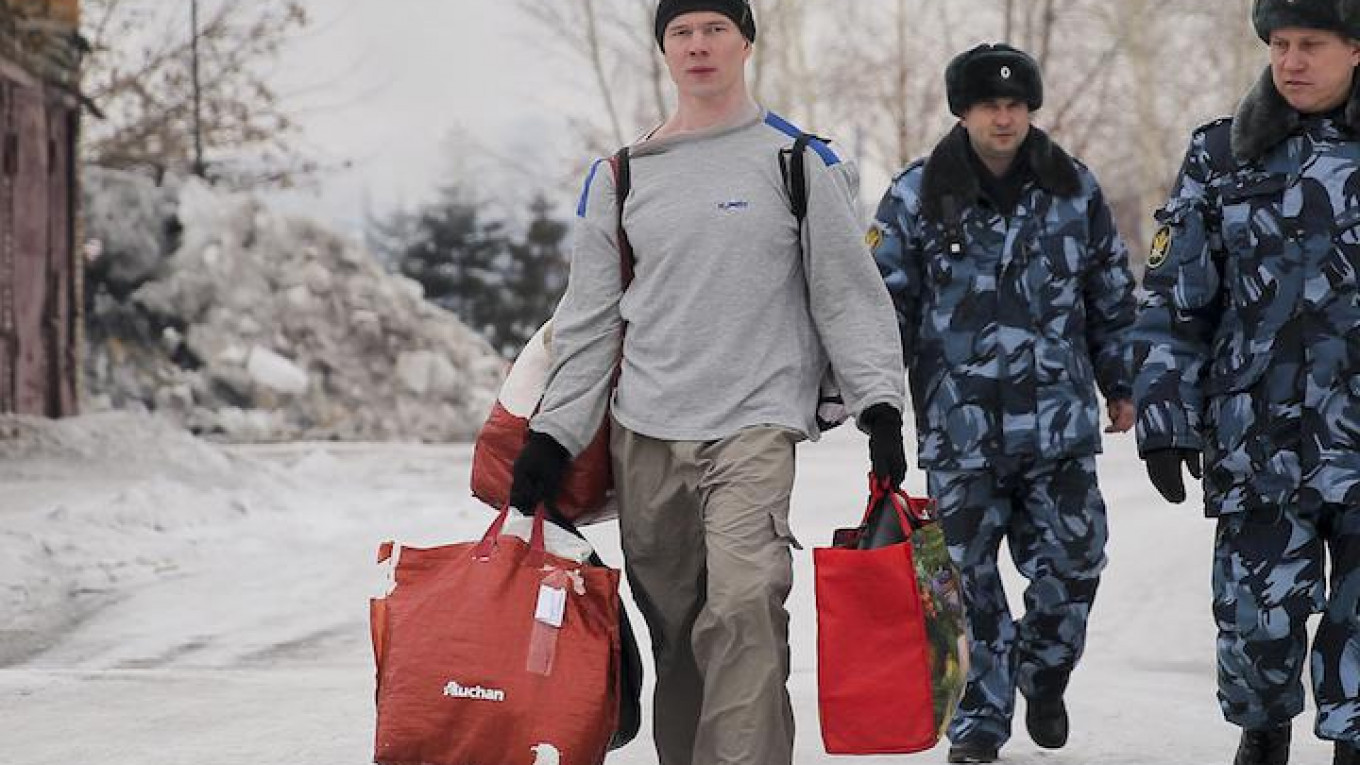For months, it wasn’t clear that Ildar Dadin would make it out of prison alive.
When his letter alleging torture in prison was published online, the jailed dissident became the face of extreme cruelty within the Russian penal system.
The fallout from that letter was swift. Within weeks, Dadin had been transferred from his Arctic prison to another cell deep in Siberia. But for over a month, he was lost in transit, completely incommunicado. Protests erupted outside the Justice Ministry in Moscow, demanding proof that Dadin was alive. Social media exploded with the hashtag #whereisildardadin.
In parallel, his lawyers pushed appeals in the Russian Constitutional Court, arguing that the original verdict impinged upon his right to protest. This ended with good news on Feb. 23, when, following a ruling to review the case, his sentence was overturned.
Dadin walked free five days later, fourteen months after his imprisonment under controversial new anti-protest legislation.
“A Criminal System”
“I am not afraid of dying,” read the letter that the activist somehow managed to smuggle out to his wife in November. “I'm more afraid of not being able to tolerate the torture.”
Speaking in a phone interview with The Moscow Times a day after his release, Dadin expanded on his experience in the Karelia IK-7 prison colony.
Initially, he says, the prison authorities abused him verbally. Then, he was brought to the prison director's office, where he was hung by his wrists and threatened with rape. He was left hanging in his cell, he says, sure he would be raped.
Dadin went to see the prison nurse, but she concluded there was no sign of abuse on his body. “The problem is the sadists know how to beat [so nobody notices],” he says.
Instead, the prison director beat him for appealing to the nurse and starting a hunger strike, Dadin alleges.
Dadin says he thought of suicide in Karelia — “when it seemed like the only way to end the suffering and the fear.” His mind was changed when he found out about the level of public support for his cause.
“They had an information blockade on me, but soon enough I found out people cared,” he says. “This is when I knew I would not die — from that moment, I knew I was safer than a lot of people outside jail.”
Steps to Release
Public pressure pushed authorities to transfer Dadin from Karelia to the more comfortable IK-5 prison colony in Altai.
“They sent me to a better prison so that I would stop talking about the torture,” Dadin says. The Siberian prison, he admits, was “a world away” from what he experienced in Karelia.
Dadin thought he would serve the rest of his sentence in Altai. When his lawyer informed him about the Constitutional Court’s ruling, he initially did not believe it.
“I'm sure they released me because of pressure in Russia and all over the world,” Dadin told The Moscow Times. “It's the way Putin's authoritarian regime works.”
The court ruled that the internationally condemned law should remain in place but, unexpectedly, said Dadin’s verdict was imposed in violation of the law. Soon after, Russia's Supreme Court confirmed the ruling.
Within a matter of hours, his wife, fellow activist Anastasia Zotova, was on a flight to the southern Siberian prison colony, 3600 kilometers east of Moscow.
Upon her arrival, however, Zotova discovered that Dadin would not be freed immediately. She stood waiting outside the prison gates, in the freezing cold, for three days. Prison authorities told her they had not been formally informed of the decision to free Ildar and were waiting for official documents from Moscow.
Dadin himself was only told his wife and sister were waiting for him outside the prison gates a few hours before his release.
“I thought it would all be over, but I was not completely sure,” he says.
Finally, on the fourth day waiting, the activist was released.
A Return to Activism
Before Dadin’s release, Zotova hinted that the couple may leave Russia once her husband was out of prison. Now, Dadin says there is no way to leave his native country.
He plans to take up to six months to recover from his year in remote Russian prisons, but will return “as soon as he can” to campaign against torture in the country.
The activist says he is sure that the torture he experienced in Karelia is happening all across Russia.
“I know that while I'm recuperating, somebody's arm is going to be broken, somebody is going to be beaten,” he says.
“My first thought was to emigrate but my conscience tells me I can't leave as long as that is happening.”
A Message from The Moscow Times:
Dear readers,
We are facing unprecedented challenges. Russia's Prosecutor General's Office has designated The Moscow Times as an "undesirable" organization, criminalizing our work and putting our staff at risk of prosecution. This follows our earlier unjust labeling as a "foreign agent."
These actions are direct attempts to silence independent journalism in Russia. The authorities claim our work "discredits the decisions of the Russian leadership." We see things differently: we strive to provide accurate, unbiased reporting on Russia.
We, the journalists of The Moscow Times, refuse to be silenced. But to continue our work, we need your help.
Your support, no matter how small, makes a world of difference. If you can, please support us monthly starting from just $2. It's quick to set up, and every contribution makes a significant impact.
By supporting The Moscow Times, you're defending open, independent journalism in the face of repression. Thank you for standing with us.
Remind me later.






